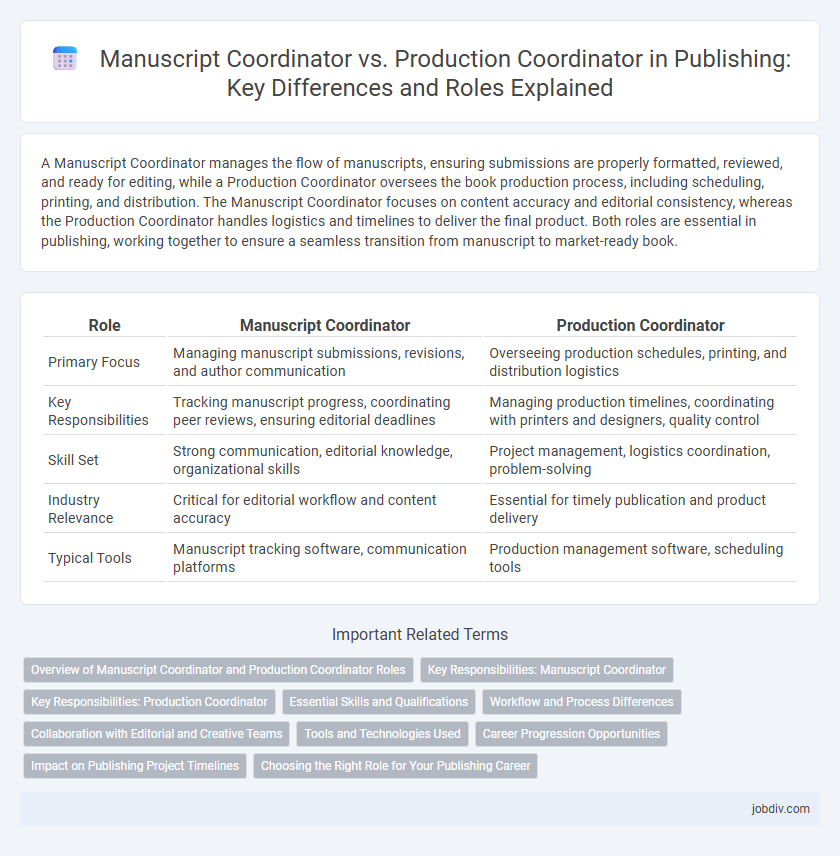A Manuscript Coordinator manages the flow of manuscripts, ensuring submissions are properly formatted, reviewed, and ready for editing, while a Production Coordinator oversees the book production process, including scheduling, printing, and distribution. The Manuscript Coordinator focuses on content accuracy and editorial consistency, whereas the Production Coordinator handles logistics and timelines to deliver the final product. Both roles are essential in publishing, working together to ensure a seamless transition from manuscript to market-ready book.
Table of Comparison
| Role | Manuscript Coordinator | Production Coordinator |
|---|---|---|
| Primary Focus | Managing manuscript submissions, revisions, and author communication | Overseeing production schedules, printing, and distribution logistics |
| Key Responsibilities | Tracking manuscript progress, coordinating peer reviews, ensuring editorial deadlines | Managing production timelines, coordinating with printers and designers, quality control |
| Skill Set | Strong communication, editorial knowledge, organizational skills | Project management, logistics coordination, problem-solving |
| Industry Relevance | Critical for editorial workflow and content accuracy | Essential for timely publication and product delivery |
| Typical Tools | Manuscript tracking software, communication platforms | Production management software, scheduling tools |
Overview of Manuscript Coordinator and Production Coordinator Roles
Manuscript Coordinators manage the organization, editing, and submission of manuscripts, ensuring adherence to publishing guidelines and timelines. Production Coordinators oversee the transition from manuscript to final product, coordinating tasks like typesetting, proofreading, and print scheduling. Both roles are critical in the publishing workflow but focus on different stages of content preparation and production.
Key Responsibilities: Manuscript Coordinator
Manuscript Coordinators manage the submission lifecycle, ensuring all manuscripts meet editorial standards and deadlines while coordinating peer reviews and revisions. They liaise between authors, editors, and reviewers to facilitate smooth communication and timely updates. Their role includes tracking manuscript progress, verifying file formats, and preparing documents for production handoff.
Key Responsibilities: Production Coordinator
Production Coordinators oversee the entire book manufacturing process, managing schedules, budgets, and vendor communications to ensure timely delivery. They coordinate with printers, designers, and editors to maintain quality control throughout production stages. Their role includes resolving issues related to printing errors, materials, and workflow efficiency to meet publishing deadlines.
Essential Skills and Qualifications
Manuscript Coordinators excel in editorial skills, attention to detail, and proficiency in manuscript management software, ensuring accurate tracking and formatting of submissions. Production Coordinators require expertise in project management, print and digital production workflows, and strong communication skills to liaise between editorial, design, and print teams. Both roles benefit from organizational abilities and familiarity with publishing industry standards, but Manuscript Coordinators emphasize content accuracy while Production Coordinators focus on meeting production deadlines.
Workflow and Process Differences
Manuscript Coordinators manage the initial stages of the publishing workflow, focusing on manuscript submissions, author queries, and ensuring proper formatting and compliance with editorial guidelines. Production Coordinators oversee the later stages, coordinating copyediting, typesetting, proofreading, and liaising with printers or digital platforms to meet publication deadlines. The key process difference lies in Manuscript Coordinators optimizing content readiness, while Production Coordinators streamline the transition from finalized manuscripts to published products.
Collaboration with Editorial and Creative Teams
Manuscript Coordinators facilitate seamless communication between authors, editors, and proofreaders, ensuring that manuscripts meet editorial standards and deadlines. Production Coordinators work closely with design teams, typesetters, and printers to transform edited manuscripts into final publishable formats. Effective collaboration between these roles streamlines the publishing workflow, enhancing accuracy and timely delivery of high-quality publications.
Tools and Technologies Used
Manuscript Coordinators primarily utilize manuscript management systems like ScholarOne and Editorial Manager to streamline submission tracking and peer review processes. Production Coordinators rely heavily on digital asset management tools such as Adobe InDesign, XML workflows, and project management platforms like Trello or Asana to oversee the transition from finalized manuscripts to printed or digital formats. Both roles leverage communication tools like Slack and email clients, but the distinct focus on submission versus production stages dictates their specialized technology stacks.
Career Progression Opportunities
Manuscript Coordinators typically gain expertise in editorial workflows and author communications, which can lead to roles such as Editorial Assistants or Project Managers within publishing houses. Production Coordinators develop skills in print and digital production processes, often advancing to Production Managers or Operations Supervisors overseeing publication timelines and budgets. Both career paths offer progression opportunities but diverge in focus, with Manuscript Coordinators leaning toward content and editorial management, while Production Coordinators specialize in technical production and logistics.
Impact on Publishing Project Timelines
The Manuscript Coordinator streamlines the submission and editing process, ensuring timely manuscript revisions and author communications that accelerate initial project phases. Production Coordinators manage the transition from manuscript to print or digital formats, overseeing schedules, vendor coordination, and quality control to prevent delays in final outputs. Efficient collaboration between these roles optimizes publishing project timelines by reducing bottlenecks from content creation through to publication.
Choosing the Right Role for Your Publishing Career
Manuscript Coordinators manage the submission, review, and editing process, ensuring manuscripts meet publisher standards and deadlines. Production Coordinators oversee the transition of accepted content into final published formats, coordinating printing, design, and distribution logistics. Selecting the right role depends on whether you prefer editorial workflow and content quality control or operational management of publication production stages.
Manuscript Coordinator vs Production Coordinator Infographic

 jobdiv.com
jobdiv.com